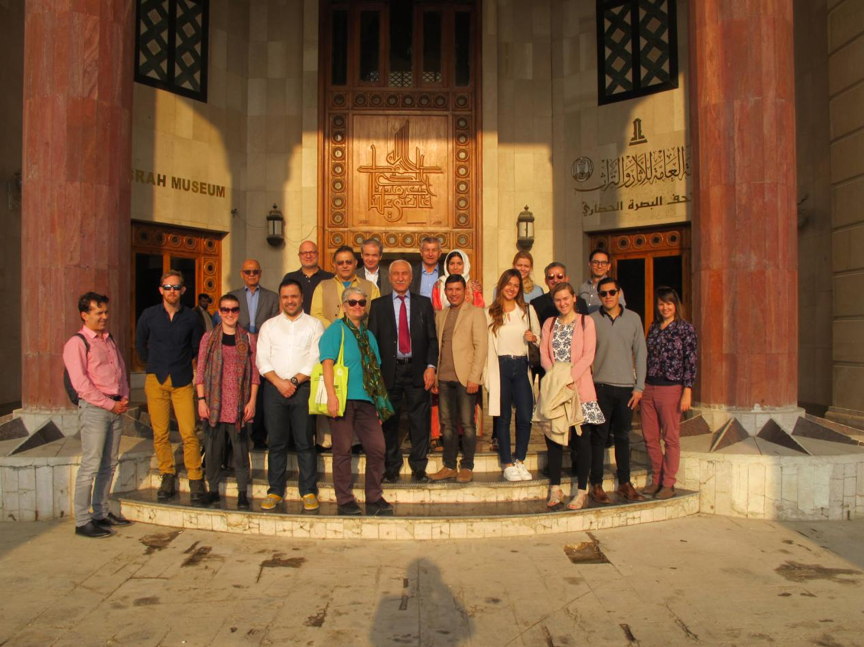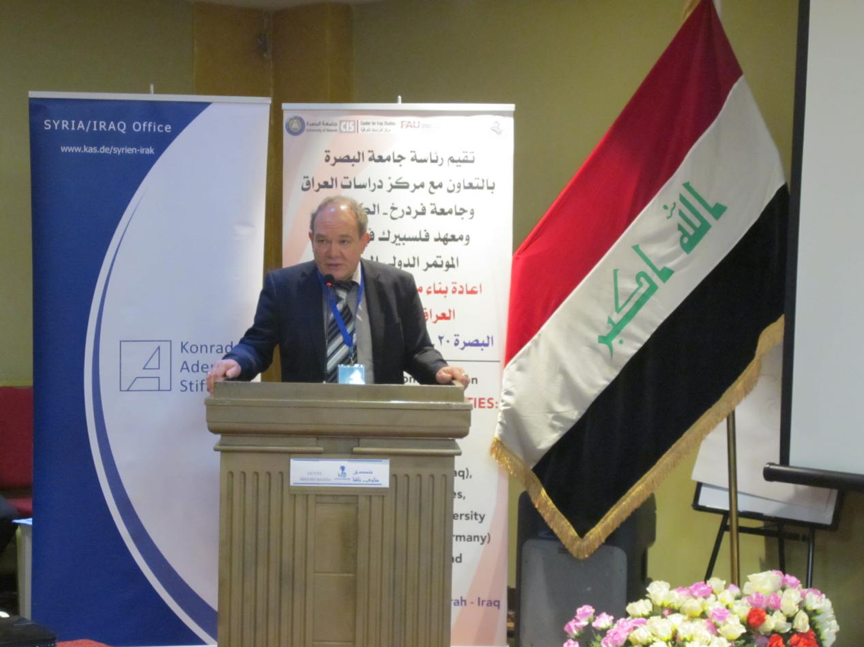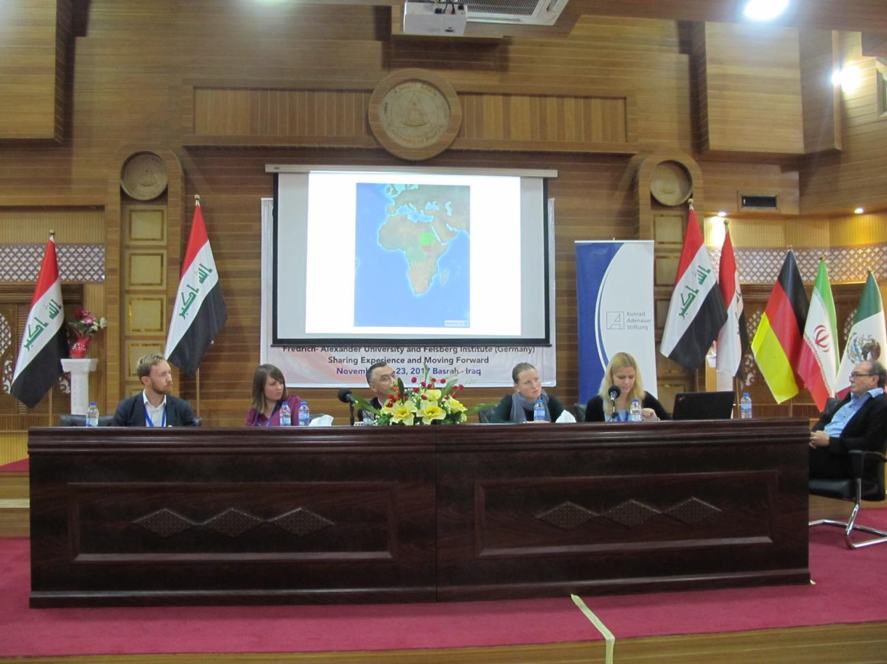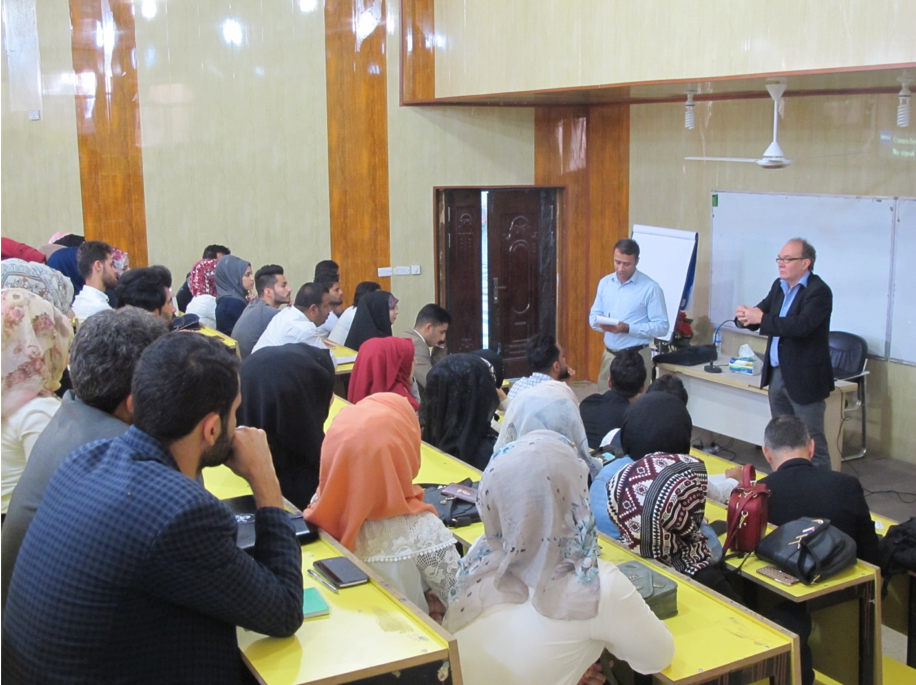2nd International Conference on "Rebuilding War Societies: Challenges and Perspectives"
Basrah, Iraq, November 20-23, 2017
The 2nd International Conference on “Rebuilding War Societies: Challenges and Perspectives” took place this year in Basrah, in the south of Iraq between the 20th and the 23rd of November 2017. The conference was organized by the Felsberger Institute in collaboration with the Center for Iraq Studies of the University of Erlangen-Nürnberg (CIS) and the University of Basra and presented in conjunction with the Annual Symposium of the Iraqi-German Academic Cooperation Network (IG-CON). Both events were hosted by the University of Basra. The conference offered a platform for the academic exchange of over 60 presenters from Iraq and abroad.

Image 1: The international participants of the conference discovering Basrah and visiting the Basrah Museum || © Katharina Drost, Centre for Iraq Studies, University of Erlangen/Nürnberg
The FI has been organizing events on violence research in Iraq since 2010, with international participation since 2012. Following Kirkuk (2012), Erbil (2013) and Sulaimaniya (2015 and 2016), the conference in Basra was the first to be held in southern Iraq.
The conference was financially supported this time by the German Academic Exchange Programme (DAAD), the Konrad Adenauer Association (KAS), and the Goethe Institute. This exchange between researchers from other areas of the world, which have also been challenged by violent conflicts, such as Colombia or Guatemala, was especially regarded as very fruitful by the Iraqi colleagues.

Image 2: Welcoming address by Dr. Hartmut Quehl, the director of the Felsberg Institute || © Katharina Drost, Centre for Iraq Studies, Universität Erlangen/Nürnberg
The 60 papers were organized thematically into eight different panels, the majority of which addressed the necessity of collective action within Iraq after the so-called Islamic State was driven back. Iraqi researchers presented their work regarding the “The role of higher education in peace building and reconciliation processes”, “Economy”, “Iraq after ISIS - Challenges and Perspectives”, “Iraq after ISIS - Community Perspectives”, “Iraq after ISIS - Mental Health and Trauma”. These five panels were backed up by an internationalized dialogue on the topics of “Transitional Justice”, “Rebuilding war societies - regional challenges and perspectives”, and “Rebuilding war societies - international experiences and perspectives”. Scholars from Germany, France, England, the Netherlands, Iran, Colombia and Lebanon shared which challenges and lessons learned from other conflict settings they could derive for Iraq.

Image 3: Nadine Abu Julud presenting her paper on the “Ethnic Conflicts in the Sudan or the Politicization of Ethnicity” as part of the Panel “Rebuilding war societies – international experiences and perspectives” || © Katharina Drost, Centre for Iraq Studies, Universität Erlangen/Nürnberg
The first two days of intense academic debates were followed by a third day of workshops offered to the students of the Basrah University. This is part of the sustainability concept behind the conferences organized by the Felsberg Institute and the Center for Iraq Studies, to strengthen the education of young researchers and enable transnational and transgenerational dialogue. The workshops offered addressed the topics “German experiences of reconstruction and reunification”, “Intercultural exchange and reconciliation”, “Migration to Europe”, “Non-Violent Political Action”, “The Quest for and the Perspectives of an Iraqi-German Students Network”, and “Entrepreneurship Skills”. The organizers were humbled by the unexpectedly high turn-out and interest among Iraqi students, as the workshops were attended by approximately 400 young Iraqi undergraduates.
The importance of this kind of approach is explained by Manuela Barrero, a young researcher from Colombia:
”The International Conference “Rebuilding War Societies: Iraq after ISIS” held from the 20th to the 23rd of November (2017) was the first international conference that I have ever attended. Also, the first event in which I presented a paper of my authorship related to my Thesis Project about the PKK’s insurgency. Therefore, the opportunity to attend the conference and travel to Iraq meant to me the feeling of a dream fulfilled in the academic aspect and also in my personal experience. Besides, the conference was enriching because of the diversity of topics presented, as well as the diversity of participants. However, the opinions that I considered most valuable were those that came from the people of Iraq because they know the place better than anyone. Hence, it was disappointing that there were not a larger number of people attending the conference, especially the absence of students. One thing I consider that could be improved is the measurement of the time of the presentations because some participants took more than 30 minutes to explain their papers. Finally, conducting a workshop allowed me to approach students of my own age despite having different cultures and helped me to encourage dialogue and debate between people living in such a different environments about our personal impressions of our countries’ lifestyles and traditions.”

Image 4: Workshop with Hartmut Quehl on the topic of migration || © Katharina Drost, Centre for Iraq Studies, Universität Erlangen/Nürnberg
Nevertheless, there is still a lot of work ahead of us, as Rebean Al-Silefanee from the Netherlands notes:
“Overall, the conference was very well organized. The content of the conference was very important and valuable to decision makers. The keynote and invited speakers delivered interesting and insightful presentations on rebuilding war societies. However, in my point of view, exclusion of youth participation in this conference was not a good idea. Since we were talking about rebuilding war societies, and usually youth are the main victims of conflict and violent extremism. Thus, we need to get them engaged more in these conferences and activities, so they are not excluded from the peacebuilding and the decision-making process in future. I also would like to mention that I liked the workshops that were organized for students, and I would recommend more workshops of this kind for the next time.”
A short report of the Center for Iraq Studies and further pictures can be found here: cis.uni-erlangen.org
A further report written by the Director of the Iraq-Desk of the Felsberg Institute, Ms. Birgit Svensson, is available in German under: goethe.de
The complete program of the conference can be consulted further below.
PROGRAMME INTERNATIONAL CONFERENCE “REBUILDING WAR SOCIETIES: IRAQ AFTER ISIS”




